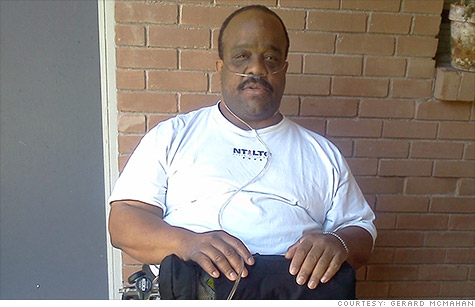
Texas resident Gerard McMahan can't afford his health care, but also doesn't qualify for Medicaid.
NEW YORK (CNNMoney) -- Texas Governor Rick Perry says he won't expand Medicaid eligibility under the health reform law because he wants to spare taxpayers billions of dollars.
But many Texas taxpayers are already shouldering the burden of the state's uninsured through higher property taxes and heftier health insurance premiums.
Travis County residents, for instance, are paying for Jeff Kehoe to see the doctor for his high blood pressure and asthma.
Kehoe, a part-time event coordinator who hasn't had insurance since 2006, goes to People's Community Clinic for his primary care. When he can afford it, the Austin resident pays up to $30 for an office visit.
The rest is picked up by taxpayers and donors.
The Travis County Healthcare District pays the clinic $133 for each visit by a patient whose income is below 200% of the poverty line. And the district gets its funding from property owners, who last year forked over $79 for every $100,000 of home value. The rate has been on the rise for the past four years.
Kehoe, 53, would most likely qualify for the expanded Medicaid program under the Affordable Care Act, which would broaden the health insurance safety net to adults with household incomes up to 133% of the poverty line.
A U.S. Supreme Court ruling essentially left it up to the states to decide whether to implement the Medicaid expansion. At least 10 governors, including Perry, quickly announced that they would not or did not plan to participate. Many cited the cost of covering more uninsured residents.
"I will not be party to socializing healthcare and bankrupting my state in direct contradiction to our Constitution and our founding principles of limited government," Perry said in a statement rejecting the expansion.
Under the Affordable Care Act, the federal government will pay the full cost of the Medicaid expansion for three years. After that, the funding will phase down to 90%.
That's still expected to cost Texas, which has the highest share of uninsured in the nation, about $1.3 billion through fiscal 2017, according to the state Health and Human Services Commission.
While Perry's decision will spare the state the additional cost, the burden of covering the uninsured will still be borne in part by residents. Most of Texas' larger urban areas have public health districts like the one in Travis County that help pay for the uninsured.
The uninsured have their care paid for in other ways too. Even without the expansion, hospitals still receive federal Medicaid money to cover the uninsured who come through their doors.
Also, some doctors' groups provide care at various Texas clinics without charge through programs such as Project Access Dallas.
And insurers may raise their premiums to cover costs incurred by the uninsured.
Nearly a third of working-age Texans, or 4.8 million people, currently lack insurance, according to Stacey Pogue, senior policy analyst for the Center for Public Policy Priorities, which advocates for low-income Texans. Medicaid expansion could provide coverage for up to 2 million of this group.
"We are paying for the cost of care for uninsured folks now," she said. "Expanding Medicaid just shifts the cost from local taxpayers and people with health insurance in part to the state budget and federal government."
Even though some uninsured have found ways to have their basic care covered, some are hoping Perry changes his mind and expands Medicaid coverage to all adults.
Gerard McMahan hasn't had insurance since he had to drop his private coverage plan in 2005 because he couldn't afford the $500 monthly fee. Plagued by congestive heart failure and attached to an oxygen tank, McMahan sees Project Access Dallas doctors who donate their time at a clinic in his hometown of Garland.
But the former painter still relies on his church to help cover his medications -- he takes 25 pills a day. McMahan still has to dodge collection calls from doctors. And he still has to wait six months to see his cardiologist.
"If I had insurance, a lot would change," said McMahan, 53. "I'd get the proper help that I need."
No comments:
Post a Comment